Overview
Ten Plus Two (+2) Education at Ganeshman Singh Multiple Campus, Kalanki, Kathmandu
Ten Plus Two (+2) Education at Ganeshman Singh Multiple Campus (GMS), Kalanki, Kathmandu, follows the National Examination Board (NEB), Nepal. The stream fits students who plan for teaching, education studies, or social-science pathways. You study Grade 11 and Grade 12 with internal tasks and NEB board exams.
Highlights
-
Affiliation: National Examination Board (NEB), Nepal
-
Duration: 2 years (Grade 11–12)
-
Focus Areas: Educational foundation, language competence, social science support papers
-
Assessment: Internal evaluation plus NEB board examinations
-
Learning Support: Library access, writing practice, classroom observation activities (as feasible)
Curriculum Details
Subject baskets are finalized during admission counseling as per NEB.
-
Core Studies: English; Education (theory and foundations); Nepali or a campus-offered social science
-
Options (subject to capacity): Population Studies; Health and Physical Education; Mathematics; Computer Science/IT; Sociology; Psychology
-
Academic Tasks: Unit tests, essays, lesson-note practice, short presentations, and project work linked to NEB learning outcomes
Clear combinations help you progress to B.Ed. or other bachelor’s routes without timetable clashes.
Objectives
-
Build a base in education theories, classroom habits, and simple assessment tasks.
-
Improve reading and writing for board-level questions.
-
Encourage reflective habits through lesson notes and peer discussion.
-
Promote ethical conduct, punctuality, and record keeping.
Scope
Students move toward B.Ed., BA, BSW, or related degrees. Early exposure to classroom processes helps you evaluate interest in teaching and education support services. Choices in Grade 11–12 influence bachelor-level subject eligibility, so careful planning matters.
Learning Outcomes
-
Explain key ideas in learning, motivation, and classroom interaction using clear examples.
-
Prepare short lesson notes and keep simple observation records.
-
Write focused essays that cite textbooks or reference handouts.
-
Use basic statistics or tables when subjects require simple data presentation.
-
Present findings from a small project using slides or posters.
Skill Development Modules
-
Lesson Basics: Aims, materials list, and short activity notes
-
Academic Writing: Paragraph structure, referencing basics, and summary skills
-
Data Sense: Tallies, percentages, and simple charts where needed
-
Communication: Short talks, group facilitation, and feedback etiquette
Teaching Methodology
Classes include lectures, tutorials, writing drills, and micro-teaching style activities. Internal tests and assignments support NEB board readiness. Library orientation and reading lists guide independent study.
Admission Requirements
-
Eligibility: SEE or equivalent from a recognized board
-
Selection: Merit-based; subject choices depend on seat capacity
-
Documents: Mark sheets, character certificate, photo ID, and recent photographs
-
Counseling: Subject basket, timetable, and internal evaluation plan
Career Opportunities
-
After +2: B.Ed. and other education or social-science degrees
-
Entry Roles (while studying further): Tuition support, classroom assistant roles where permitted, library/record support
-
Longer Term (after bachelor’s/licensing): School teaching, education project support, training assistance
Scholarships and Financial Aid
-
Merit Support: Limited concessions as per campus policy
-
Need-Based: Considered case-by-case within rules and seat limits
-
External Schemes: Follow government or donor notices issued during the session
Why Choose This Course?
-
Teacher Pathway: Early exposure to lesson notes and classroom routines
-
Writing Focus: Regular essays and internal tests that mirror board tasks
-
Progression: Clear route to B.Ed. and education-related bachelor’s study
Conclusion
+2 Education at GMS offers a steady platform for teaching-oriented students. Careful subject selection, regular writing practice, and disciplined record keeping guide strong outcomes in NEB exams and future study.
FAQ
Q1. Which subjects suit a future B.Ed.?
Strong choices include Education with English, Nepali, and a social science or math/IT, depending on your bachelor’s plan.
Q2. Is field observation compulsory?
Short observation or school visits may be scheduled when feasible and within policy.
Q3. Can I change subjects in Grade 11?
Changes depend on time of request, seat availability, and NEB guidelines.
Q4. How are internals counted?
Unit tests, assignments, and attendance support board preparation under campus rules.
Q5. What if I plan to study psychology or population later?
Choose supporting papers now to build continuity for BA/B.Ed. combinations at bachelor’s level.






















